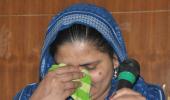All the 11 life term convicts in the Bilkis Bano case of the 2002 riots were released as per the remission policy prevalent in Gujarat at the time of their conviction in 2008, a top government official said on Tuesday and rejected claims of contravention of the Centre's guidelines in the matter.

The government's assertion, enunciated by the senior home department official, came in the wake of opposition claims that the remission for the convicts, serving life imprisonment for the gang rape of a pregnant Bilkis Bano and murder of seven of her family members during the post-Godhra riots, was a violation of the Centre's guidelines.
In June this year, the Centre had issued special guidelines to states for the release of convicted prisoners as part of the Azadi Ka Amrit Mahotsav (75 years of Independence) celebrations. As per the policy, rape convicts were not entitled for premature release from jail.
However, according to Gujarat Additional Chief Secretary, Home, Raj Kumar, the Supreme Court had asked the government to consider early release of these 11 convicts under the state's remission policy which was in effect when they were pronounced guilty in the case by the trial court.
"These 11 persons were convicted by a special court in Mumbai in 2008. At the time of conviction, Gujarat was following a remission policy which came into effect in 1992. When the matter reached the Supreme Court, it directed us to decide about the release under the 1992 policy, because that was prevalent when conviction came in 2008," Kumar told PTI.
Gujarat adopted a new and revised remission policy for prisoners in 2014.
In that policy, which is currently in effect, there are detailed guidelines about categories of convicts who can or can not be given relief, said the senior bureaucrat.
"Since the conviction took place in 2008, the SC directed us to consider this case under the 1992 policy, which was in effect in 2008. That policy did not have any specific clarity as to who can be given remission and who can not. That policy was not that detailed in comparison to the 2014 policy," said the IAS officer.
He said the guidelines about premature release issued by the Centre on the occasion of Azadi Ka Amrit Mahotsav do not apply in the Bilkis Bano case because the SC had directed the state government to take into account the 1992 policy.
The central government recently introduced a scheme, which is part of Prime Minister Narendra Modi's plans to celebrate Azadi Ka Amrit Mahotsav, in which convicts women and transgender, male prisoners above the age of 60 and physically challenged, who have completed more than half their total sentence will be released, as per home ministry guidelines.
Poor or indigent prisoners who have completed their sentence but are still in jail due to non-payment of fines imposed on them will benefit too with their fines being waived.
According to a recent home ministry communication to all states and Union territories, prisoners who fulfil the eligibility criteria will be released in three phases -- on August 15, 2022, January 26, 2023 and August 15, 2023.
The scheme, the ministry had said, does not apply to prisoners sentenced to death or life imprisonment, and convicted in rape, terror charges, dowry deaths and money laundering cases.
Those convicted under the Explosives Act, the National Security Act, the Official Secrets Act, the Anti-Hijacking Act as well as those convicted for human trafficking will also not be considered for remission.
The eligibility criteria for prisoners to be considered for remission includes convicts who have consistently maintained good conduct during their term in prisons, especially those with no punishment during the sentencing period in the last three years.
On August 15, all the 11 convicts sentenced to life imprisonment in the post-Godhra Bilkis Bano gang rape case walked out of the Godhra sub-jail after the Gujarat government allowed their release under its remission policy.
A special Central Bureau of Investigation court in Mumbai had on January 21, 2008, sentenced the 11 accused to life imprisonment on the charges of gang rape and murder of seven members of Bilkis Bano's family. Their conviction was later upheld by the Bombay high court.
These convicts had served more than 15 years in jail after which one of them approached the Supreme Court with a plea for his premature release. The apex court had directed the Gujarat government to look into the issue of remission of his sentence following which the state formed a committee.
The communal riots had erupted after the Godhra train burning incident in which 59 passengers, mostly 'kar sevaks', were killed on February 27, 2002.











 © 2025
© 2025